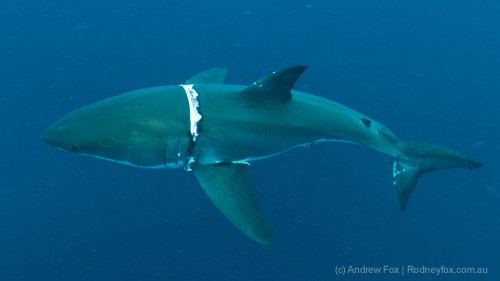Great white shark freed from plastic noose

GREAT WHITE SHARKS ARE usually feared for their threat to humans in the ocean, but one shark has found out how dangerous humans can be.
In late September, local divers spotted what seemed to be a subdued great white shark during an expedition about 50 km from Port Lincoln, South Australia. The 2.5 m great white (or white pointer) was being slowly choked by a ribbon of plastic strap encircling his torso. He was affectionally nicknamed Strappy because of his predicament.
Cutting into his flesh, the plastic had restricted use of Strappy’s left fin, and had completely destroyed part of his gills, says Andrew Fox, part of the father-and-son team that runs dive tour operator Rodney Fox Shark Expeditions.
“From the look of the wounds I reckon he’d been suffering for a couple of months and [I thought] if we didn’t do something, he would go downhill fast,” Andrew says. “He probably wouldn’t have lasted much more than another month.”

Dicing with death
Andrew has been diving with great whites for 31 of his 45 years. Son of the legendary shark diver, Rodney Fox, Andrew says he’s been in the water since childhood. Rodney, who was mauled by a great white shark in 1963, went on to develop the shark cage. He was one of the first people to capture the species on film, with some of his footage used in the movie Jaws. He is also a great advocate of shark conservation.
Over the span of a couple of expeditions in September, Rodney, Andrew and others tried to free Strappy, first from the side of the boat, then from the safety of a shark cage.
The cage was sitting on the ocean floor about 20 m below the surface, and Strappy repeatedly swam past it as if he knew the divers were trying to help him, Andrew says. Finally he came close enough and Andrew was able to sever the strap by reaching out from the cage and sliding a knife between the shark’s flesh and the plastic strapping. The plastic still remained embeded into Strappy’s flesh, but a short while later Andrew was able to reach out and pull the plastic free.
“We saw him several days later; he had a big pot belly from a recent feed and looked much happier. I reckon he was really grateful,” he told Australian Geographic.

The crew attempting to free Strappy from the plastic from the deck of the boat
Plastic death
Unfortunately, this is not an unusual event. Earlier this year Andrew cut fishing line from another shark, as he did last year and the year before that.
Darren Kindleysides, director of the Australian Marine Conservation Society says that many marine species get caught in this kind of debris, as well as abandoned ‘ghost fishing’ nets. Everything from fishes and whales to turtles, penguins and jellyfish can become entangled.
“On a global level, three times more rubbish is dumped into the oceans than there are kilograms of fish caught,” says Darren. “Unfortunately, plastic debris is one of the biggest threats to marine life, and with the amount of plastics we produce and dump increasing, it’s not surprising our marine life is increasingly becoming entangled.”
Rodney Fox Expeditions has been working in conjunction with Flinders University and the South Australian Research and Development Institute (SARDI) to help with shark research.
Some cooperative studies have included testing the possible effects of berleying (attracting sharks to bait and then capturing them) on behaviour; population ecology; and tissue sampling.
You can sponsor Strappy and receive a picture and bio of him, with all proceeds going to the work of the Fox Shark Research Foundation.
RELATED STORIES




